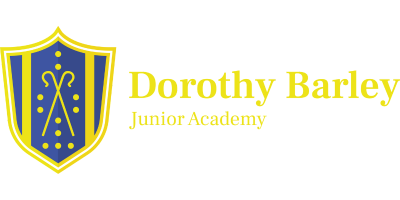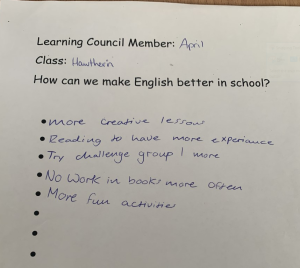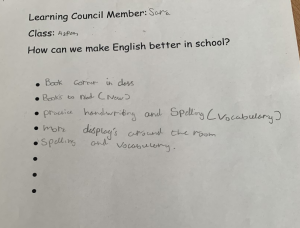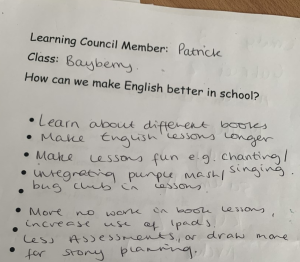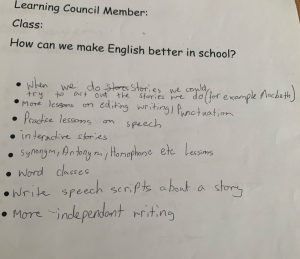Pupil Voice at DBJA
We ensure our children are involved in the design of their curriculum at DBJA. We have an active Learning Council who support school leaders across the school to develop, review and assess the impact of our curriculum. Their focus is on teaching and learning and they are called our Learning Council. Our active School Council support non-academic initiatives for example, Eco Schools and Anti-Bullying.
Our DBJA Learning Council
Our Learning Council at DBJA work alongside school leaders to support curriculum development. This means they may be involved in a number of academic initiatives for example, helping deliver parent workshops, reviewing marking & feedback policies, delivering assemblies focused on, for example, the use of targets to develop our learning. They may also be involved in gathering pupil voice responses about our curriculum and raising the profile of subjects through, for example, judging our writing competition. Within our Learning Council children help shape Maths, Literacy, Values and overall Curriculum aims. These children were voted using an application process and they decided what they wanted to achieve.
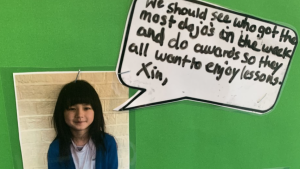
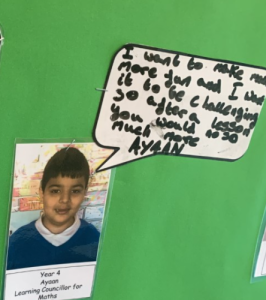
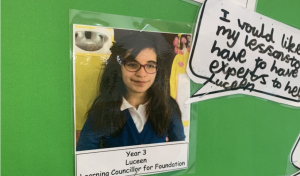
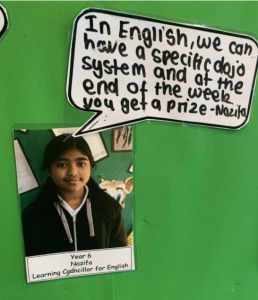
This year, the Learning Council have helped to decide the winners of the Anti-Bullying Competition and some Learning Value competitions. We have started looking at how to improve the curriculum and have asked our classes how to improve English. These are some of our class responses. Our next task is to think about how we will implement these changes into our lessons.
Our Curriculum
Our curriculum is robust and is planned and delivered within the framework created by our values.
The curriculum is broad and balanced and provides significant opportunity for children to apply and express their knowledge and understanding across subject areas. Our curriculum provides children with a range of rich and memorable learning experiences. We believe that a rich diet of learning experiences is undoubtedly the best way to develop well-rounded, happy children who have the cultural capital to be able to face all of life’s challenges and opportunities.
Our Intent
- To engage children through interesting topics and hands-on activities
- To make meaningful links between subjects whenever possible
- To develop children’s skills, knowledge and understanding of a range of themes and concepts
- To make effective connections to the real world
- To help children to think creatively and solve problems
- To develop children’s capacities to work independently and collaboratively
- To enable children to make choices about their learning
- To take account of children’s interests and fascinations
Implementation: Our Curriculum Approach
Our overall curriculum approach provides children with a range of rich and memorable learning experiences. We believe that a rich diet of learning experiences is the best way to develop well-rounded, happy children who have the cultural capital to be able to face all of life’s challenges and opportunities. Progression is carefully planned with ‘knowledge organisers/road maps’ used across all foundation subjects focusing on age related expectations and higher-level skills for those children working at greater depth. The core curriculum offer is brought to life through a range of educational visits, experience days and 11b411 linked events.
Our curriculum at DBJA is supported by a range of high quality curriculum support materials which are aligned with National Curriculum expectations. In addition, children and families are encouraged to create family projects at home. These are then shared with the class and are used in celebratory displays of the class learning at the end of the unit. At the end of each half term, teachers choose children who have created an ‘Outstanding Family Learning Project’ and this work is celebrated with the whole school in assembly. This promote our Learning Values of Self – Worth and Resilience.
Each unit lasts for half a term and focuses on the key knowledge and skills set out in the National Curriculum. All work is suitably scaffolded to ensure that all children are able to make good progress. To ensure that we are giving children as many learning opportunities as possible, we make full use of our varied outdoor learning areas and ensure all children have at least 6 educational visits or themed experiences each year.
Impact: What do we expect to see?
We plan our lessons with clear learning objectives. We base these upon the teacher’s detailed knowledge of each child, striving to ensure that all tasks set are appropriate to each child’s level of ability. Our lesson plans make clear the expected outcomes for each lesson.
Day‐to‐day, on-going assessment is a crucial method of assessment which provides instant feedback to the teacher and ensures progress within every lesson. AfL (Assessment for Learning) strategies are used in all lessons. These strategies provide a clear picture of a child’s level of understanding and, ensure that teachers can quickly assess when a child does not understand and needs greater support. Lessons are flexible enough to allow teachers to adapt to the needs of the child. This summative assessment information is used to inform planning for subsequent lessons.
Progress is assessed regularly. At the end of each term, assessment data is gathered and progress is checked by subject leaders and the Senior Leadership Team. Children are expected to make good or better progress in all subjects and this individual progress is tracked. In cases where children are identified as making less than expected progress in English or Maths, rapid interventions are put in place to address gaps in learning.
At DBJA the child is at the centre of everything we do and they will be provided with an opportunity to:
- Develop confidence
- Become global citizens
- Become critical thinkers
- Develop independence
- Take responsibility
- Appreciate diversity
Maths
Maths at DBJA is supported using White Rose Maths. The White Rose approach to Maths has been influenced, inspired and informed by the work of leading maths researchers and practitioners across the world.The aim is to develop a whole new culture of deep understanding, confidence and competence in maths –a culture that produces strong, secure learning and real progress. We also allocate additional gap filling sessions, additional work on timestables and provide cross-curricular links where possible. Mathlectics is used to support home-learning. The PiXL timetable app is also used at home.
English
Literacy at DBJA involves retelling stories, creating stories and using Talk4Writing in non-fiction units. We ensure that genre coverage is broad and balanced and each half term children will have the opportunity to write to entertain, write to persuade and write to inform. Where possible, we make links with the wider curriculum topics being learnt.
To engage and inspire children, in reading, we use a whole class approach which follows Destination Reader. Children are given the opportunity to read both age appropriate books, which are enjoyed as a whole class, and ability appropriate books. The approach allows for key skills to be modelled and embedded while increasing the children’s reading mileage and love of reading. When phonics teaching is required, we use the Little Wandle Phonics Programme to support children. Each classroom has a selection banded books to ensure children are reading ability level books in order to make progress and gain confidence in their reading. Bug Club is used at home to support home-learning.
Foundation Subjects
To enable children to have the opportunity to investigate and develop skills in depth we use a range of high quality curriculum resources. At the end of each term, children are assessed as to their level of attainment against the school’s year group expectations in each foundation subject area. Personal, social and health education (PSHE), Religious Education (RE), Physical Education (PE) and, for KS2, French as modern foreign language, are taught consistently throughout all terms.
Geography & History
At DBJA, each year group will learn about Geography and History based topics throughout the year. Every year group will have the opportunity to learn about topics that will expand their knowledge of Great Britain and the world. In addition, each year group will take part in exciting trips/activities that are related to Geography and History.
Science & Healthy Schools
At DBJA we believe that scientific investigation is one of the most powerful ways to learn; developing curiosity and perseverance as well as challenging what we know about the world. The National Curriculum provides a structure and skills progression for the Science curriculum taught and assessed throughout the school, which is linked, where possible, to the theme topics providing a creative scheme of work, which reflects a balanced programme of study. We aim to make Science as practical as possible, linking it to real life contexts and giving a meaning to our learning. Science lessons are open ended and practical in nature, allowing children to use a wide range of resources to lead the learning and make their own discoveries. This allows children to develop the key skills of investigation, problem solving and team work; empowering children to question the world around them and become scientific thinkers. Scientific thinking is not just limited to the classroom; we encourage children to continue their enquiries at home with parents through our termly science projects.
RE, PSHE & SMSC
At DBJA, our RE curriculum is based upon the six major religions and the local authority agreed scheme ‘Learning for Life’ with each year group focusing on a different theme each year, such as worship or clothing. This allows the children to experience a greater understanding of a range of religions. All year groups visit a place of worship as well, such as the year 5 visit to the Buddhist temple. In PSHCE, children attend a PSHCE themed assembly weekly, which follows a medium term plan which meets all objectives. This is followed up by an in-class assembly, which allows children to discuss what they have learnt, using techniques such as circle time or debates. The children also participate in a P4C lesson at the beginning of each half term, which allows them to develop into effective, critical and creative thinkers and to take responsibility for their own learning in a caring and collaborative environment. Through Values based Education we promote our core values throughout the curriculum.
The Arts
At DBJA we are committed to children accessing a range of lessons including The Arts. Children have attended The Young Voices concert at the O2, performing in front of hundreds of people, we have attended the local authority Music Festival hosted by other schools. In Year 5 all children learn the guitar. Children listen and appraise music weekly with the opportunity to compose their own piece of music at the end of each term. Charanga is used to support Music across the school.
11before11
Introduction to REAch2 11b411 at Dorothy Barley Junior Academy
“Dare to be different. Be a pioneer. Be a leader. Be the kind of person who in the face of adversity will continue to embrace life and walk fearlessly toward the challenge.” -Oprah Winfrey.
Life is an adventure.
As part of REAch2 Academy Trust we are a school committed to the 11b411 initiative. REAch2 are ambitious for our children to have broad horizons in life and high aspirations for themselves. We want our children to be inspired and challenged so that each one can develop their unique potential to the full.
To this end, we have developed the 11 before 11 set of promises, to empower our children to take the driving seat in their own lives. 11 before 11 is designed to take our children beyond the usual school experiences to deliver a range of memorable events that surprise and delight the child; both realising and releasing their potential in a wide range of contexts. 11 before 11 ensures that the touchstone of enjoyment is central to our children’s learning as they progress through our family of schools.
11 before 11 will take our children beyond the usual, to open opportunities in life and inspire them to move forward in their own life’s adventure.
Our School Adventure Ambassador (SAA) brings the promises to life at our school, through planning the adventures into the school’s curriculum; seeking sponsorship; funding; resources and links within and beyond the community. Our Adventure Ambassador also has access to Trust brokered partnerships such as the Scouts Association, Country Trust, Prince William Award, and Sport for Schools.
Termly Curriculum Maps
Autumn 1 Overview
Autumn 2 Overview
Spring 1 Overview
Spring 2 Overview
Summer 1 Overview
Summer 2 Overview
Further Information
If you would like to know more about our curriculum, please call the office on 0208 270 4962 or email the office on [email protected]
